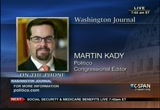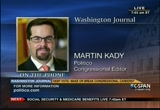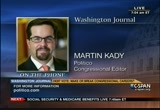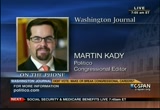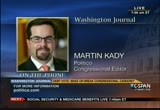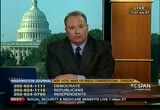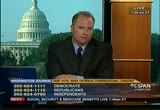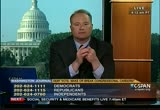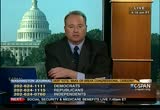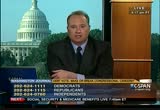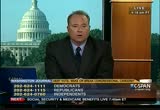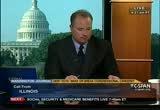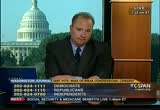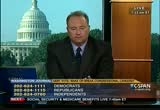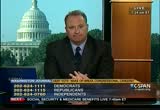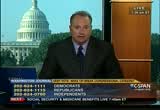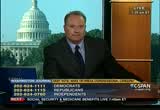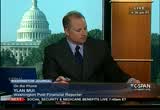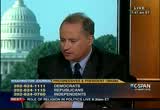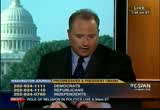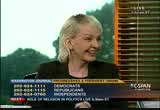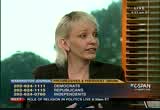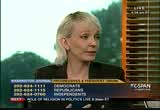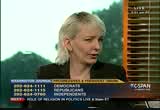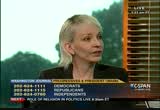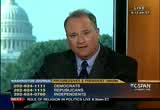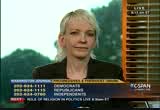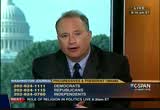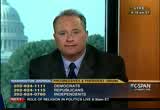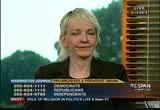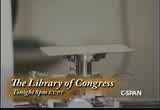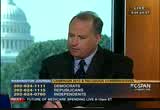tv Washington Journal CSPAN July 18, 2011 7:00am-10:00am EDT
7:00 am
2012 field. also we will explain the role of the parent advisory board which to make spending reductions in medicare. "washington journal" is next. ♪ ♪ host: members of the house will vote on the issues regarding the debt ceiling. in the meantime, "usa today" has a piece regarding potential political strife. we want to get your thoughts on
7:01 am
this monday morning, july 18. how about this that vote? should it make or break a congressional career? democrats, call 202-324-1111. republicans, 202-324-1115. independence, 202-324 --gregory court writes this. former congressman spoke about his vote to raise the national debt limit saying it was more like an albatross.
7:02 am
7:03 am
the schedule. when they sit down publicly, it is a little bit more feeder. there will be action this week as you indicate. there will be votes on the house floor and maybe even the senate floor. this is not the actual vote. the package is something that the conservatives want to check up on but has no chance of passing the senate. host: explain it for us. guest: a vow to cut spending and balance the budget. it sounds like common sense on the surface. the problem is the way it is written. the cap on spending is a hard cap. it is hard to overcome when you have an emergency.
7:04 am
an example is a terrorist attack. balance the budget seems common sense. and this is different. it requires a two-thirds threshold of both chambers of commerce. basically a supermajority to ever raise taxes. it makes it almost impossible to get an increase in tax revenue. many mainstream republicans are not one to go for that. host: a lot of this week's action is a scripted on the floor. can you give us a broader picture of this debt limit to that is a living? guest: we believe there is going to be a deal, but i cannot say what it is right now. this week is about debate. republicans say there is a price
7:05 am
to pay for increasing the debt limit. the voters are going to say, we voted on this. a very strong conservative strong cut and cap and balance thing. then we go into the real negotiations at the end of the week and into next week, where we will have to call for something. there are a lot of options out there. there are a lot of doomsday scenarios out there. we may come down to the wire like we always do in congress. host: there is a headline in your publication this morning. what is the latest there? guest: david rogers writes about this. it is a pretty hard right turn. [inaudible]
7:06 am
it is 80 per to proposal. -- it is a tea party proposal. as remove towards the default working on something that has no chance of becoming law, that becomes a problem. once a lot of republicans voted for this, -- it is not the one that is going to become law. we are moving into uncharted territory. there is a certain debt limit and a skeptics' group out there. they to not believe there are negative consequences to pass in the august 2 default deadline. host: what is the posture of the white house currently? hasn't shifted over the past few days -- has it shifted over the past few days? guest: i think they are looking
7:07 am
at a deal short of this cut, cap, and balance. the would like a big deal as obama calls it. speaker john boehner is interested in that, but not much support in making a deal from his own caucus. willing to open his mind to a smaller deal. host: you can read more at com.olitico dot martin kady was joing us. thanks. we are looking at how this issue will be alert and impact the elections of politicians.
7:08 am
should this make or break a congressional career? connecticut, good morning to you. caller: this is a great example of how it will have an impact on congressional careers. there are two factors. one is doing nothing, if it is presented as normal and responsible behavior, and to come up with specific cuts on the other hand and is portrayed as dangerous, republicans will pay a price, because the irresponsible behavior that got us into this. the other aspect is who do you believe? the president falsifying the health insurance aspect of his mother's cancer could be so
7:09 am
troubling. if the president would make up false tales about what health insurance companies did or did not do for his mother, imagine what he would say about republicans in this debate. who has credibility is a key aspect. the other half is who is lying in who is telling the truth. host: welcome to the program larry. caller: i do not believe it will make or break a career. the career ought to be viewed by the voters as far as the body of work or the body of the votes of the representative.
7:10 am
the boating public should want to look at all. their overall voting represent their opinions on how the government should be run. i do believe that the american people are watching what is going on in congress and they see who is stopping boats. they see who is trying to get the country to move in a positive direction. i think it is sad that there is so much talk and finger- pointing and so much a lack of respect on the republican side.
7:11 am
7:12 am
cut, cap, and balance of the house for tomorrow. next caller. caller: if you were a ceo of a company can't you had to make money for this company -- and you had to make money for this company and you realized you were out of money and wanted to borrow more money than i had, you would be fired. it should definitely break all of the careers.
7:13 am
ironically, no pun intended, congress is laughing to the bank, because their paychecks will not be hurt. they put a cap on government employee dollars for two years. everyone involved that burt this country to the ground financially is not getting hurt in any financial way or form. america needs to vote these guys out of office. you have already destroyed our country financially, so we will give you more money so you can destroy as more. they have proven that they cannot handle the job time and time again. host: more from the peace in "usa today." -- what has changed?
7:14 am
7:15 am
without the tea party, we would not have this debate. that is what one person rights. and republicans in cincinnati, welcome to the program. caller: my comment is regarding whether or not to the decision should make or break careers. i do not think they should ask congress is trying to resolve decisions made by the prior administration, both republicans and democrats. i think we will have to deal with some struggle and hardship to write this, but it is something we will talk to deal with. i am close to retirement.
7:16 am
we have put money into social security and medicare. people are resilient in reply to respond to whatever the decisions are to deal with the situation. host: democrat line, st. pete, florida. caller: it should not affect the career, but it will. right now, people are more concerned about their careers staying in washington rather than getting elected to do what they were in it -- rather than doing what they were elected to do. host: more of your calls coming up. we have about half an hour left in this segment and then we will jane hamsher. hamshe
7:17 am
here is a look regarding the debt talks. >> republican leaders have made it clear that if all else fails, our efforts to adopt legislation to cut the deficit, put a straitjacket on it and balance the budget, -- if that does not pass the senate, and there is no other way to reach some kind of savings agreement, then at the end of the day, republican leaders have made it clear that we are not the ones responsible for the government's state. -- c-span.o[unintelligible] at the end of the day, i do not think there will be a default. host: we will get to track lucien a minute.
7:18 am
-- jack in just a minute. independent scholar. -- caller. caller: the congress and president need to get this straightened out. they should have been eight% federal recoup back. they need to put it towards paying off the debt. host: surely, florida, republican. -- shirley, florida, republican. caller: i have not heard them
7:19 am
mention of that the largest group of entitlement takers are the recipients of the u.s. government employees. the senators, the congressmen and women. put that on the table as well. host: another call from florida, a democrat. caller: >> they will pay a critical price. the republicans will make sure of it. political posturing, major corporations, they are doing what is right for the american people. host: here is the white house budget director on "meet the
7:20 am
press" yesterday. >> it is time to get something done. the president has made it clear he wants to do something substantial. look at past agreements. it takes leadership on both sides. it took clinton and gingrich. the question is do we have a partner to work with? i hope the answer to that is yes. host: here is the headline. paying the price of a debt limit the votes. they say the issue can be costly to careers for politicians. this is the headline from "usa today." they write this bleeder below.
7:21 am
7:22 am
republican that signed that agreement that they would not raise any taxes should still have their chop after all of this happens. they are not able to vote for any loopholes or anything. host: 4 lauderdale, florida. -- fort lauderdale, florida. caller: i think they should do what is correct for the country, at a time especially like this. people looking at the united states from the outside -- if we do not get a good big deal, what are they going to be saying to themselves? they will say, even in the face of armageddon, they could not get it done.
7:23 am
what is that going to do to the image of the united states in the financial and international community? i have an idea that the republicans could put forward to make everyone happy. here it is, exclusive to c-span. -- excludingd be th family farms, 10% above $1 million. there would be an unlimited tax shelter for property fund that is two years residential property for the person in the will. that would put a big tail wind
7:24 am
behind the biggest problem we have in this nation. that is the housing industry. the linchpin of this economy. why not get creative in the area of inheritance taxes? host: will you pitch your ideas to your congressman? caller: i hope i just did. thanks for your input to this morning, tom. host: mass., a democrat. caller: i hope this affects republican careers. these people have stood up for the interest of the corporate community for way too long. and i can get a guy the to work
7:25 am
for 30 cents a day, why should i pay for some guy in the united states to work for $8 an hour work? we need to get a fair trade, not just a free trade but a fair trade policy. stat is so we can get americans back to work. -- that is so we can get americans back to work. host: last year, they write republican campaigns and their allies spent more than $10 million in an ad regarding the debt limit vote.
7:26 am
maryann, chicago, independent. caller: raising the debt ceiling is to pay off money that we already know. if we do not pay it, we are going to default. it is just like going into bankruptcy. we will not be able to carry on businesses with other countries. host: what do you see happening to the career of a member of congress depending on how he or she votes? caller: republicans are not -- locked in with the tea party. their careers will probably be affected. they locked their own selves into it, so i do not know what could happen.
7:27 am
host: here is the illinois senator dick durbin on all of this on "meet the press" on sunday. >> keep in mind, it was the economic policy of the bush administration that led us into a situation where we were to double the national debt under president george bush. now those same policies, giving tax breaks to the wealthy americans -- those people who minimize the impact of a default on the debt ceiling and on america's debt and the full faith in credit had said things that are outrageous. things that presidential candidates in iowa -- one says he is sprain poured upon -- for default. -- one says she is praying for defaults. that is highly irresponsible. host: and from twitter.
7:28 am
7:29 am
richmond, virginia, charles, a republican. caller: i am still proud to be a republican, because i believe in the values. we have to think about the midterm elections. the primaries bowed out of the decent republican people that were working with the government to make things right. the tea party came along with this idea -- i actually do not know what it is all about.
7:30 am
a minimalse could win vote. -- with a minimal vote. we cannot have people in their that talk treason and ideas about not taking care of your responsibilities. the europeans love this, because the euro is something they are pushing the dollar. the people in the united states think we will not pay the debt and be all right, but every household that you live in, you
7:31 am
make deals, things are high, you usually make more money. we have people around the world -- we have to take care of our business. i am retired and in more debt. i still work -- i am in more debt than i ever was. host: thanks for your thoughts. an article from "politico." -- they say the last solution to the debt ceiling crisis from mcconnell -- they come into work today. they will do some non- controversial items.
7:32 am
this cut, cap, and balance legislation will go through the committee this evening. we will be there, and it will be on the floor tomorrow. here is the front page of the "hill." there is a lot on the line on intense negotiations of raising the debt ceiling. plenty of maneuvering going on. more of your calls in just a couple of minutes. we want to get the latest on a story refers started hearing about yesterday. here is the follow up peace in the "washington post." the headline says obama fast the former ohio attorney general to lead a new consumer agency.
7:33 am
explain why not elizabeth warren for this consumer bureau? >> it is about who obama is planning to name. a popular figure among progressives. she calls the tracks and the traps of the financial industry. because of her strong rhetoric on this issue, it has made her very popular among liberals and an anathema to an industry she would be regulating. a real concern that ms. warren would not be able to be confirmed for the position. no one may be confirmed for the position. republicans have about block anyone that obama put out.
7:34 am
we will see if they are able to stick to that pledge. host: explain to us who this new face is. they point out that he is a former jeopardy champion. >> he is a friday reigning winner back in the 1980's. he is well known in consumer circles for his early works. he lost his bid for reelection back in november. he has been at the consumer protection financial bureau. he is going to lead their enforcement operation regulating things that break the law. he does not have the same history and polarizing nature
7:35 am
that could impede the confirmation of elizabeth warren. host: how will putting out this nomination today worked and will the white house get this new nominee? caller: they are hoping to appease the supporters of elizabeth warren. liberals are very disappointed that she was not named. they hope they are willing to accept this new candidate. the president plans to formally announce this today. the confirmation could happen in the next 10 weeks. it is uncertain if it will play out. there have to do this before the senate breaks for recess.
7:36 am
can't they may have to appoint this candidate through other means as well. host: republicans still want to make changes to the agency's structure before they agree to any nomination. tell us more about what they are looking to do. guest: this is part of the bill.er of frank be dodd frank they are trying to change the leadership so that it is a five member commission. there are trying to ensure that there is a strong for a precise of the decisions by other regulatory bodies.
7:37 am
and make the bureau subject to the appropriations process. right now it is funded through the federal reserve, keeping the man a little bit safer, rather than having to go through an office that is potentially contentious. host: thanks a lot for this setup interview this morning. we will watch out for the president's announcement later today. tampa, fla., mike, a democrat. how about this vote coming? should it have the power to make or break a political career? caller: absolutely. take away the entitlement benefit -- benefits for the elected officials. too much fraud in medicare.
7:38 am
7:39 am
7:40 am
wrote a constitution were high on politicians making a career in washington, d.c. airlin if you are raising the debt ceiling, you are being an adult. these adults have given us this out-of-control spending in government that is no longer constitutional. these are not adults. it is about time the republicans and independents stand up to these guys and say enough is enough. host: that was pretty from california. from california.
7:41 am
7:42 am
7:43 am
it is all about politics. the problems of the people in this country -- who is to care about it but to them? host: akron, ohio, independent line. caller: i was raised in a defendant -- family, pro-life, can serve a tip, a democrat. times have changed -- conservative democrat. times have changed. a house that is praying for the wrecking ball cannot stand. the presumption of the gop is as long as a black man owns the house, who really cares? host: that was our last call. i want to show you the front page of the "guardian" out of the uk. it shows a picture of stevenson
7:44 am
after his resignation last night. he announced his shock resignation last night after his failure to inform authorities about the opening inquiries into phone hacking. that story broke yesterday. we will continue to look at it and events from london, including a major hearing tomorrow that we will have on c- span3 live tomorrow. in the meantime, more on your calls regarding budget matters. in a few minutes, richard land will be here to take questions. he is of the southern baptist convention. after this, we will have jane
7:45 am
hamsher. we will be right back. ♪ ♪ >> tonight on the "communicators, and robert mcdowell on the actions this week on cracking down on up the rest service charges. that and other issues in front of the fcc tonight on the "communicators" on c-span2. >> with titles like slender, can kolter has something to say. ann coulter you can
7:46 am
catch her live, on book tv, august 7. >> book tv connection with politicians and journalists. watch live coverage of the house during the week day. and supreme court oral argument. on the weekend, see a signature in a few program. saturday, the "communicators" sunday, "q&a", "news bankers", and "prime minister's questions." c-span, washington your way. public service created by cable companies.
7:47 am
"washington journal quebec continues. host: at the table, founder of firedog lake blog, jane hamsher. we are talking about the future of spending in this country. guest: we have been organizing around the attempts to cut social security benefits. it looks like they are really going to do something this time. we are asking people to go to their local congress office and tell their member of congress that they oppose it. host: how big will it be? guest: we have already had it thousand people commit to doing this. people are concerned understandably. they need to put a face to it. host: what darker thoughts on
7:48 am
the idea of a balanced budget and how to get there? guest: i think -- the conclusion of a family budget and the united states government is probably not the best way to look at what we are doing right now. i think cutting programs, especially domestic spending programs, are bad for the economy. most economists would agree with it. host: how fired up are you and your people about this issue? guest: i think social security is a defining issue for those that define themselves as democrats. the willingness of this president and congress to go after it changes what the democratic party stands for.
7:49 am
host: here are the numbers to call to speed withjane hamsher. they are at the bottom -- to speak with jane hamsher. they are at the bottom of your screen. here is a little bit of president obama from friday. >> this is tough on the democratic side as well. some of the things i spoke about and said i would be willing to see happen, there are some democrats think it is unacceptable. i am trying to sell that if you are a progressive, you should be concerned about debt and deficit, just as much as if you are a conservative. the only thing we are talking about over the next year or so is debt and deficit, then it is
7:50 am
hard to start talking about how to make investments in community colleges so our kids are trained. how to be rebuilt to dollar trillion worth of structures? if you care about making investments in our kids and in the structure, and basic research, then you should want ever fiscal house in order, so that every time we propose a new initiative, someone does not throw up their hands and say more government, more fixed spending. host: you wrote we must act now to save social security and medicare. what should we be thinking and feeling right now, which is to adopt a liberal policy. tell us more.
7:51 am
guest: no matter what the president does, there is always going to be someone raising their hand. . do you hope to cut enough out of social security and medicare? they just passed a continuation of the bush tax cut last year. that is what punched a hole in this deficit. to handle one without the other , and lower taxes on people and now fight this battle on raising taxes, and to cut so security and medicare is a problem for americans that overwhelmingly oppose it. many agree that this is not the way to handle this.
7:52 am
it is like a rabbit came to try to cut social security and medicare. the republicans have offered to clean debt ceiling increase with no cuts. host: when you hear the phrase, shared sacrifice, what does it mean? guest: it seems to mean shared between the poor and the elderly. what we are looking at is probably a commission that could not come to an agreement, but was in support of cutting social security and medicare. president obama said he put support the cuts, but would not support the defense cuts.
7:53 am
host: first call is from wyoming, a republican. caller: thanks for being there. i always appreciate c-span. i will get to the point and take any comments he may have often the air. why do people from the left and never state the facts that sells a security reforms that have been talked about in recent years to not touch anybody 55 years or older? that is one question. then, social security will become insolvent down the road. everyone on both sides of the aisle agrees on that. they never want to mention the reasons why this might be necessary.
7:54 am
although we all pay into social security, in this day and age, people take in more than they ever paid in. guest: 55 years or younger, that is not true. they are talking about a cost- of-living adjustment and the way they calculate it. social security has plenty of money and it is absolutely solvent. the government is obligated to pay it. it will not become insolvent. the treasury notes that are in there are good. there are the same that everyone else has across the world.
7:55 am
unless you say the government is not. to pay its debt, which i do not think people want to do -- unless you are saying that the government should not pay its debt, i do not think any of those arguments work. host: our guest is the founder of firedog lake blog. about 30 minutes longer. democrat, next. caller: i was wondering if you have had the chance to look at a bill proposed that a congressman from pennsylvania made.
7:56 am
it deals with taxes. i have a comment about the tea party. they want to take us back to 1958. some white anglo-saxon protestants want to be in charge of everything and know their place. i would remind them to read the american dollar bill, where it has the phrase in at 10,e pluribus unum. -- phrase in latin, e pluribus unum. i do not understand why they want to take us back there. guest: some believe we should
7:57 am
cut down so security benefits and medicare. it is ironic that both parties are conspiring to do this, when the american public does not want that. host: one person talk about consumption tax. there is a lot on the table on the tax issue. any particular aspect you want to see? guest: i want to see them protect security and medicare benefits. i think there are several wars that are not free that we should start talking about that the american people are not in support of any more. congress seems to be ignorant of what the american people want. they do not want so security and medicare benefits cut in order to balance the budget and cut the deficit.
7:58 am
they will -- they want to see cut in other places. host: how are they dealing with the speaker and minority leader? guest: mitch mcconnell came out with a proposal but we will offer up a clean debt ceiling vote with no spending cuts attached. the president did not like it, because it had three branches of increase that he would have to take personal responsibility for. nancy pelosi and hillary reid said they support it. she was taking part in the debt ceiling negotiations. when john boehner said on friday that he would not be going to camp david, because the but house was considering negotiations there, nancy
7:59 am
pelosi said the same thing. her role in all of this is weird right now. she seems to be reluctant to impose this vote. host: new jersey, independent. caller: i do not agree with you about having some cuts to social security and other expenses. there should be cuts on a lot of wasted programs in the government. we cannot just continue our spending. it is out of control. 40 cents of every dollar is spent -- it is to sustain our lifestyle.
8:00 am
the comment about taking a clean vote for the debt ceiling. that is a cop out. congress needs to do their job. they need to make these hard choices. we will have to increase taxes on the wealthy. they are paying 14% that is ridiculous. we have to raise taxes on the rich. look, we're going to have to make some cuts. some of the cuts they're talking about are not great. i do not think he should cut such as security, but if you have to, compromise to get a big deal done, that is fine. education is a bad cut. right now we're falling further and further behind the rest of the world in education. if they have to make some sort of cuts there, you may have to do it. we may not even have a country
8:01 am
to worry about if we continue the way we are. host: thank you. we get the point. guest: i do not agree we have to make cuts to social security or medicare and neither does the rest of the country. i agree the wealthy should pay more. i do not think we should have extended the bush tax cuts for them last year. i was in support of drawing the line at $1 million. the president was anxious to do a deal and that is why we are here. host: talking about nancy pelosi, you're not sure why nancy pelosi is not opposing the vote on the caucus. what do you mean? guest: i am not sure what is going on. they are probably going to jam a vote on them that forces them to have a mission. a debt commission that the president very much wanted have in congress voted against last year.
8:02 am
i think it was in 2009. that is why the president appointed the deficit commission. this is something that congress does when they wanted to the unpopular things. it is what they did when they did the base closings. no individual senators or member of congress wanted to take responsibility for that, so they had a commission, but the set of recommendations with an up or down vote with no possibility of amendment. i think that is the way that will finally cut medicare and social security. it is very undemocratic. what they're basically saying, we're not on use congressional process. we're going to not use the normal rules of order to do something that is incredibly unpopular. host: here is an advertisement called "jam session." >> today's seniors understand the benefits of social security and medicare. they know these programs will be just as important for future generations, so why is
8:03 am
washington talking about benefit cuts? stand with us and tell congress, don't cut so security and medicare. because we pay into these programs with every paycheck and americans of all ages in the security these benefits provide. host: jane hamsher, your efforts specifically to mark to express opposition, you talk about 2000 people pledging support? >> i think that was from friday. i think we have more now. we're asking people to visit their member of congress tomorrow. president obama says we have to eat a ourpeas. -- eat our peas. you can go too far the dog from -- you can go to firedoglake.com. there is an information chic you can download.
8:04 am
it really lets the member of congress know up close and personal these people depend on this money. cutting it off right now is not only terrible for them, but the economy. consumer sentiment has dropped to its lowest point i think since 2009 at the height of the economic downturn because of the debt ceiling talks. it is having a terrible impact on the economy. telling senior citizens they may not get their check is highly irresponsible. host: we just asked if it should make corporate the career of congress. having a vote regarding social security? guest: i think so. i think they should lose their seats if they vote for this. host: mike, republican. caller: good morning. i was arrogant like the members of congress and the senators and everyone along those lines up until 2008. in 2008, i was going in for back surgery and was found with terminal cancer.
8:05 am
in june 2009, i went on medical disability. and announced to me. i did not even know i was eligible. the doctor told me to file. guess what? in june of this year, i was eligible for medicare. i was on social security disability. i was eligible for medicare. i had to continue working during that time because my private insurance when i was allowed to make wall drawing disability, i had to work to pay my private insurance for two years. and now i am on social security. by a private entrance is fixing to lapse. guess what? i get -- i wished i worked at congress because are in the congressman or senators on medicare? guest: i believe several of them
8:06 am
are of an age to receive medicare. i am very sorry you had this illness. i am happy that so security and medicare have been there for you. americans have the confidence that if it happens to you, it happens to them. so security and medicare will be there to catch them. that is the contract the american government has had with the new people that we will never go through what we went through before in the great depression. i do not think congress understands how fundamentally americans trust this. their turn to say this has to happen for the fiscal secured of the country, -- they are trying to say this has happened for fiscal security of the country. wars, bombs, will subsidies. you name it, there is a long list. i really think that going after the money that is sustaining people like you is really a moral and an american. kansas.t's go to
8:07 am
caller: good morning. my question is, why does congress want to stop paying social security and medicare when they take a medicare and social security out of people's checks a week? i want to know, why can they just come to a conclusion and stop that? they're putting money in other places like to the war, places like that in afghanistan, to other wars. that is my question. guest: two interesting things your question brings up. when fdr designed so security, he said, we're going to put it on your checks every week so you will see it being taken out and you will note it is there for you. that was very, very important to fdr and the preservation of the social safety net. also, he said, we are going to make sure that every time --
8:08 am
that you know this is something that is solvent, but the money is there in the bank so it is not a welfare program but it should not be means tested. we all know what happens to welfare programs. we all know they go under the knife. he said it had to apply to everyone. that is one of the things they want to attack at this point, too. you may say, well, the wealthy should not because it is in financial trouble. it is not. the minute you make of a welfare program, the death warrant. host: we have heard recruitment efforts will be hurt by any perceived abandonment in the area of medicare by democratic leaders. your thoughts? your efforts this weekend organizing, what will you be telling folks? guest: if they support in the
8:09 am
cuts to social secure the and medicare benefits, that we will not support any politician who does this. i think is important people in both parties do this. all parties need to know this is how the public feels. stickies role, i am amazed that would try to do this. -- steve israel, i'm amazed they would try to do this. one of the big calling cards of the republicans in 2010 was about democrats try to cut medicare benefits. i do not think they did, but that was largely a premise. remember, they understand the american public, both parties with is protected. you need to go and tell them this. go and tell them. if you're on medicare or social security, if you depend on this, go to their office tomorrow and let them know this is how you feel because they are not
8:10 am
getting at host:. who are supporting for president in 2012? guest: good question. i do not think anyone needs to commit to vote for anyone right now. there is a very long time between now and the election. i think elections are opportunities to encourage the people that you like to do the right thing. i encourage president obama to do the right thing. i encourage him not to cut social security and medicare benefits or means test and i encourage him not to start a commission with the purpose of cutting social security and medicare benefits. that is what i would very much like to see and a presidential candidate. host: i have to ask, if he allows any cuts or reductions to go through, where you go in terms of the next election? guest: we have had 50,000 people pledged it would not support any politician who supports these cuts. that means president obama if he supports that, same criteria
8:11 am
applies to an. i do not know who will be running in 2012, but i hope the president does the right thing and i end up supporting him. host: independent, new hampshire. to my: i've been talking representative and the speaker of the houses office, try to get so sick to the runoff from the time we had social security -- i've been trying to get social security runoff. no one can seem to tell me where it has gone. basically in washington, they have this as their own bank. they get their sticky fingers in that and we never get a runoff of where this money went. guest: that is a very good question read in the 2000 election, they're talking about the lock box, that there would not region as a secure the money
8:12 am
in order to pay government expenses. -- that they would not reach into social security in order to pay government expenses. the lid got blown off that. if you ask people like alan simpson, they will say they spent on roads and bridges. you cannot say, we took this unfunded wars. but that is where the budget swelling came from. host: one question, is your guest some social security and medicare has no fraud and abuse? millions are cheating or liberal system. guest: if there is fraud, i support cutting it. but we're talking about cutting the cost of living increase for social security, means testing it, cutting medicare benefits, increasing copays, increasing the retirement age -- which would be a huge benefit cut to people over the course of their lifetime. host: bob, republican.
8:13 am
good morning. caller: i have been watching this stuff on sosa security and everything. i have been on it for good number of years. most of the money that comes through, some people do not make that much on social security. if they end up cutting are putting their fingers in it, so to speak, some of these people do not make a lot of money in social security and depend on this to pay for their medical bills and their food and rent and everything else. the problem i have come i live in missouri. the problem i have, me and another fellow and saying with, we are both on disability. as it is, we are barely making it month by month. i could not believe they were even thinking about cutting social security. i have never had a president --
8:14 am
i called social security myself and they said, no, we do not know if there will be out on the second because they go to the banks. they were telling me they do not know if there will be out on the second or not. guest: so security is telling you that? they cannot legally not pay this. it is unconstitutional. i am astounded they are telling you this. i understand you are a republican. this is typical what we hear from people. no one wants this to happen. host: democrat, texas. caller: me and my son are both on disability. we have cancer and are barely surviving on social security. i have a brother in law and sister-in-law the same way. if we do without that, we cannot buy groceries or medical or pay
8:15 am
our rent. we are very worried. i did call social security, but they said there is no word yet on that. i am worried how we will pay our mortgage and everything next month. guest: i am so sorry. it is tragic you have to have this fear. it is released during the people who depend on this -- really scaring the people who depend on this. it is unconscionable that we continue to wage moral wars. the people do not have the confidence the money they have paid into this will not be there. i urge everyone come visit your member of congress tomorrow. tell their staff in the office that you cared enough to show up and let them know how strong the field. they will do this. they really want to do this. this fear mongering, basically, that they're doing is to make you scared they have to make cuts to in order to keep paying
8:16 am
out benefits. it is not true. host: how about the debt limit in the debates in the pressure here in washington? if you look at the folks on the hill, what do you see? guest: it is manufacturer. they have raised the debt ceiling i think seven times under george bush. everyone knows it has to be done. eventually, obama was right, the republicans will have to cave because the banks will not let them not do it but they put it in his court and said, you have to take responsibility for it. we will make sure people get their social security on august 2. the president is the one who is saying, no. he is saying, the democratic party is saying we want spending cuts along with the raising of the debt ceiling. they're doing more damage to the economy with the politics they are playing in the situation. guest: akron, ohio, independent.
8:17 am
caller: i kind of agree with you. i am disappointed obama would even mention trying to cut social security. let me ask a question and i will hang up and listen to you. shouldn't the capital raised at least from what it is now like $109,000 of income? i mean, to mean, that seems logical. why would you not raise it to $250,000 of income that social security would be taxed on that and come? i will hang up and listen. guest: the caller is talking about the cap on the amount of money you earn the social security taxes are taken from. it seems like to be a much better solution, something far more american support to raise the cap, if there is more money needed, rather than to make cuts
8:18 am
in the program or benefits. if you believe that, go to your member of congress to mark in their office. tell their staff this is how you think. they do not seem to get that. host: what about the higher retirement age of rock? guest: it is horrible. it is no different than the paul ryan plan. it forces them on to the exchanges. it puts them in the exchanges and if they reach a certain income level, they are given essentially vouchers. it is sort of a first step on that front, too. but people who are poor, who do manual labor, are more likely to need medicare earlier than people who are wealthy. it is a very, very, very aggressive move. host: republican line. welcome to the program.
8:19 am
caller: i have a question print i keep hearing we need to cut this and we need to cut that. so security and medicare was a contract in the government and the american people that he would be there for us. it is money that should have never been touched by the politicians. there should be an accounting in washington, d.c. to the american people, how much money they should have how much is taken out of social security and why it has not been paid back. and how many people in this country pass away each year at retirement age and never draw that first time of social security? where does that money go to? how much money -- how much of that money does the federal government keep? if we are going to tighten the belt, then we need answers from the government of what they're doing with the money they take in.
8:20 am
and the politicians need to tighten the purse strings on some of this idiotic spending they do and get this country back on the right track with things that needs to be or it needs to have money spent on it first. and then all of this other stuff can be put into play secondary, wants the needs of the american people needs our debt was first. guest: i will note this children it is a republican and he said it is a contract with the american people, social security and medicare benefits, and he wants an accounting. ultimately, we agree on the same thing. do not get these benefits. these are benefits the government said they will pay out. host: here are a couple of emails for you -- guest: it has been reported in
8:21 am
several papers that these are the things being considered. we are taking the news at face value. he also said in his own press conference that we had to keep our peas any thought this was the time for cuts. i think you can only go with what is currently being discussed. host: and another one -- guest: yes, i think that is a good point. everyone talks about st. ronald reagan, but he actually raised taxes after he cut them. we do not have the kind of responsible politicians in washington, d.c. who will make that tough choice against party- line, putting country above politics. host: try this one -- well, the were not voting
8:22 am
on social security and medicare. had they been, they would have voted to keep it. host: georgia from north carolina, a democrat. caller: i am worried about medicare, medicaid and social security. i get medicare. i do realize there are a lot of frogs and both the systems, medicare and medicaid, which i think should be looked into because a lot of people are all other peoples cards and things like that and get help. what i am most interested in is social security. that is the people's money. i, for one, that is the only money i have coming into my household, which i'm sure many, many, many other people have. if i do not get my checks on the third, i will be evicted. my ranch will not be paid. my electrical not be paid.
8:23 am
my phone will not be paid. i will have no money. i have exactly $10 to my name. i do not think it is correct for the federal government to take after the little guy. i bet you 2 cents if the republicans had to live on the amount of money we get and social sickened for one month, they would change their tune. guest: i am sorry you have that anxiety and fear. especial when the fed continues to shovel out free money to banks. they are threatening to knock on the social security checks is absolutely ridiculous. i am very sorry about that. i hope everyone will visit the member of congress tomorrow and let them know this is the situation that millions of americans are in, and that this is not where they can start tightening their belts. this is not the place to do. whether you are republican or democrat, whether you think the
8:24 am
deficit needs to be closed or not, americans believe this is not the place to do the cuts. you can get the information from firedoglake.com. there is a fact sheet you can download and give to them. there is a speech you can read to them to give them the facts. it is important to voice heard now because it will vote to do this very soon. unless you let them know you're watching this -- watching them and do not support this, that is what will happen. host: we've talked a lot about social security and medicare. what about other social issues heading into the 2012 campaign? what is first and foremost on your mind in that area? guest: social issues? impacting the elections? i think dan choi who is the veteran who was discharged under don't ask, don't tell, was
8:25 am
arrested in front of the white house. that is one of the reasons people feel don't ask, don't tell ultimately passed. people are routinely arrested in front of the white house all the time and charged with misdemeanors. dan choi is the first person been charged by the department of justice as a felony and is trial is august 29. i think it will met a lot of people very, very angry. they really believe having the assistant u.s. attorney bringing charges against dan choi in court is going to have a really bad impact on the view of people on the left, that the white house, the administration, the justice department is trying to enact revenge on him for what he did. host: independent, north carolina. caller: good morning. my thing is, they have already tapped into so security --
8:26 am
social security. we to get cost-of-living increases and we do not anymore, so they have already taken away from us. why are we always the main players in the wars in rebuilding instead of other countries doing it? we put all of our money for that. we should take these congress people and cut their paychecks and see how they like living on it. guest: i think that is great, cutting their pay to the average americans pay. people have not received cost of living increases partly in the way they increase but -- the way determine inflation. it is an even more regressive way, so you'll receive even less. that is a big concern. again, go to a member of congress tomorrow and tell them what you think. host: from twitter --
8:27 am
the last call, for lauderdale, florida, a democrat. caller: good morning. i just want to know the basic of all of this. this country was founded on teamwork, working together. when serious have come before us in the past, when we came together as one, we were able to do things. what i do not understand, jane hamsher i thought you went around the question earlier about the tea party. what are the organizations like this today that a taken as fact primarily to medieval times? i think this is something that is destructive toward the government.
8:28 am
we should be doing something positive, not striking fear and everyone. as you said, the news wires posting things about what the president is saying and what he is willing to cut. until we know exactly what he is going to cut, to me, this seems like we're striking more fear. i think we should be doing things positive. we should not be worried about reelection. i think if it was not for that, the debt situation would be solved. wheat as the people automatically know politics comes first in congress, and should not. i want to hear what you have to say. i also want you to answer with the earlier caller said about the tea party, what they represent, and they're being disruptive for the government. that is my opinion. i think there are organizations
8:29 am
out there and i think they been an american. host: thank you. guest: no. 1, the president said social security checks might not go out august 2. he did the fear mongering. i think the tea party has been destructive and i think they're largely responsible for highly polarized and released to the debate right now. it is focused on cutting the deficit at a time when we're in a serious economic crisis, the midst of a recession. classically, that has been a stupid thing to do. we see that already. we're losing jobs. the jobs situation is not good. consumer sentiment isn't a bad place largely because of the debt crisis. -- is in a bad place largely because of the debt crisis. i think we're here largely because of their influence, but i do not think responding to the inference by cutting social
8:30 am
security and medicare even most members of the tea party won. again, i go back to that. we're looking at something extremely undemocratic. we're looking at both parties of congress conspiring against the will of the people in order to what they want in the face of a manufactured crisis. i think that is a really, really bad place. host: jane hamsher, founder of firedoglake blog. you can read all about it on firedoglake.com. thank you for joining us. coming up, a health policy correspondent for national public radio in about 45 minutes but we will talk about spending reductions. lots of your calls on tap for the subject, for sure. after this short break, we will have richard land, president of the ethics and religious commission of the southern baptist convention. he will take your calls as well. in the meantime, news from c-
8:31 am
span radio. >> the delaware lama in remarks earlier on in b.c.'s "today" says of his weakened visit with obama that he was gratified to show an old friend's face. the last weekend visit with obama that he was gratified to show an old friend's face. in his national tv appearance, he also urged americans not to get discouraged by the debate over the national debt turning to the war in afghanistan, general david petraeus has handed over command of american and coalition forces general john allen as he moves on to his next position as head of the cia. while nato forces say through international service members have been killed today, in a bomb blast in eastern afghanistan, no further details of the deaths were yet available. more on the phone hacking in britain, david cameron is
8:32 am
cutting short an african trip and ordering a special parliamentary session, extending the session on the start of a scheduled summer recess for emergency meeting on wednesday. this following the resignation of britain's top police officer and the rest of rebekah brooks, the former ceo of rupert murdoch's news international. mr. murdoch, his son james and ms. brooks are set to testify before a parliamentary inquiry tomorrow. you can hear it live at 9:30 a.m. eastern here on c-span radio. those are some of the latest headlines. >> had ever visited the library of congress? over 2 million people have and now this is your chance to tour the world's largest library. tonight, join c-span for a rare glimpse inside the library of congress. we will take you into the great hall and explore the main reading room. unique books and rare books and special collections including original books from thomas jefferson's personal collection.
8:33 am
but we will see how the library is using modern technology to discover hidden secrets and preserve its holdings for future generations. join us for the library of congress tonight at 8:00 p.m. eastern and pacific on c-span. host available on television, radio, online and social media networking sites. fine air content any time through seas and video library. -- find our content any time through c-span video library. it is washington, your way, the c-span network now available and more than 100 million homes. greeted by cable, provided as a public surface. host: at the table, richard land of the southern baptist convention. all of these fiscal matters.
8:34 am
in terms of how a religious conservative views the nation's debt? >> guest: we're borrowing 41 ces of every dollar our government spends. we have been living way beyond our means for a long time. if we do not quickly address it, and i mean quickly and significantly, we're going to foreclose our children and grandchildren's future. they will spend their entire lives paying off our debt. my generation will be the first generation in american history to be quick to the children and grandchildren and or standard of living than the one we had. my parents would be aghast at this the world war ii generation would be aghast. their whole lives were dedicated to us, perhaps unhappily so. one comment about the baby boomers, we reduce stars of our families and we never got over
8:35 am
it. this is generational theft. one of the 10 commandments is, thou shalt not steal. host: how you feel we got here? guest: remember al gore talking about a lock box in the 2000 election. there is no lock box. the president let that out of the bag. the president said we may not be a list send social security checks. what happened to the trust fund? the trust fund was raided. what is in the trust fund is a huge stack of iou's from congress when it took the money paid into sources security and spent and for other things. -- into social security and spent it for other things if the checks to not go out, the government takes in about $200 billion a month.
8:36 am
social security checks are $50 billion a month. we can pay the interest on we go and pay the social security checks and pay the $35 million that is medicare and medicaid and not the fault iand i think t would be a choice the president makes. i think it is despicable he is trying to scare social secure recipients into thinking if we do not raise the debt ceiling, that they will not get their checks. if they do not, it would be the choice of the obama administration and secretary of treasury. host: our guest is richard land of the southern baptist commission. the phone numbers are on the bottom of the screen but we're talking about the campaign 2012. conservatives who are running and the greek fiscal issues that everyone is wrestling with here in washington. -- we're talking about the conservative and fiscal issues that everyone is wrestling with here in washington. richard land, what should be
8:37 am
cut, from your point of view? guest: almost everything. when you're looking at a budget such as this one, first of all, i've seen very few budgets to could not take a 5% cut. i would have 5% across-the-board cut. secondly, i think we could start with the $200 billion that the gao identified $200,000,000,000.38 triplicate and wasteful programs that do not do any good. $200 billion. that is a good place to start. there many places we could cut. frankly, i do not think planned parenthood should be getting $400 million from the american government. i think npr can function just fine on its own. that would be nearly $1 billion a year, $10 billion over a decade, if we just cut out those
8:38 am
two programs. there many places we could cut that we're spending on programs that we do not need, wasteful programs. when the gao cn find $200 billion in cuts, that a significant. host: in your view, what is the proper role of government? guest: xiii, the government is ordained by god. punish those who do evil and reward those which is right. the government should be maintaining law and order and to be fostering a society in which exemplary behavior is rewarded and less than exemplary behavior is not. and there's a moral symmetry to the society. i think government and the
8:39 am
country as wealthy as ours, we should be looking out for the welfare and health of the people within the ability of the government and the ability of the country to pay we cannot do everything. that is part of the problem. washington has been tried to do everything. they have been kicking the can down the road. now we've reached the place we can no longer can get down the road. we're going to become greece. there is no one to bail us out if we go into default. host: our guest, the host of "richard land life, closed with a three-hour program. -- "richard land live," a three- hour program. guest: we're on the air every saturday. i start talking about topics until people start calling.
8:40 am
one of the ways to keep myself interested is, i wonder at a time -- which topic will get people calling? i am seldom right. [laughter] it often is a surprise to me what it's the calls coming, what is them far enough to call in a positive or negative. host: florida, independent, john. good morning. caller: you guys make me think of some any questions. i've a comment about c-span 3 yesterday. they had a wonderful program from debt ceiling debate from 1990, 21 years ago. they worse in the exact same things we're arguing about today -- they were saying the exact same things we're arguing about today. i think mr. durbin, a representative back there, mentioned when social 61st
8:41 am
started, the maximum amount you could take out of a check was $30 back in 1939 read it went to $600 in 1969. during the debate of 1990 when the program was taking place, the maximum amount they could take out was $3,000. it is a ponzi scheme. my father was born in 1916. when he retired in 1981, they had taken out $13,000. he lived on until 1997 and collected over $300,000. this trust fund, so this may -- so to say, there is no trust fund. that is why clinton had a surplus. that surplus was because he put the amount that is in the social security trust fund into that figure that made it appeared to
8:42 am
be a surplus. we never had a surplus. the bottom line is, this is a ponzi scheme. the government does not take this money and invest it like a bank would. they do not lend it out and get 19% interest like credit cards or 8% on mortgages, so you cannot generate a critical mass of money for the retirement generation because -- like i said, my father put in 13,000 and got out $330,000. who makes up that difference? the taxpayers. guest: i cannot agree more. i am one of the beneficiaries. i am the first year of the baby boomers. i read an article that said if i live out a normal life span, i will get about $300 in medicare and social security for every dollar i put in. my parents, who are a little younger than your parents, and are still alive, have gotten many, many times more out of so security than they put in.
8:43 am
it is a ponzi scheme. if a private entity did with the federal government is doing with social security, they would go to jail. it is what brain madoff went to jail for. they're taking money from current contributors to pay for those are currently retired. that will not last much longer because with the baby boomers, tenerife first 1946 -- january 1 1946 and general first 2011, the first baby boomer turns 65. every eight seconds for the next 18 years, a baby boomer will turn 65. that is a huge, huge, 78 million generation burden on social security. there is no way or no argument that we are going to be a to bring our fiscal house in order without adjustments to social
8:44 am
security. we can no longer afford a one size fits all kind of retirement plan that we have. i'm not talking about those who are currently retired and those who are nearing retirement, but for those who are say 55 and younger, we're going to have to give them some warning that we are going to have to say or tax more of social security for those who have other means -- no one is talking about taking away social security from those who have that is the only retirement income. but there are millions of americans who have irs'a and other retirement programs. and other retirement programs. we will have to tax them at higher rates in order to keep the program solvent for everyone. host: mississippi, a democrat.
8:45 am
caller: been morning. i want to ask the preacher a question. whenever you hear it were going on in the tax breaks for the rich and money taken at of social security, why is it going to them people? guest: i am for a far more simplified tax system and what we have now. i'm not here to argue for tax breaks for the rich. but those are not causing us to spend or to borrow 41 cents of every dollar that our government spends. we bring in $200 billion a month right now, and $50 billion of that is going for social security payments. that is with just the first year of baby boomers begin to retire. another $35 billion in medicare and medicaid. you understand, at some point,
8:46 am
it is just going to submerge us. i am for a far more simplified tax system than the one we have now. i would lower the rates along the terms of the some symbols commission and cut out loopholes. i think we should be incentivizing capital formation and productivity rather than incentivizing intelligent people spending their time trying to figure out how to avoid paying taxes. host: plenty more time for your calls. here is an e-mail. don't you think churches and religious organizations should be paying taxes? church and state is supposed to be two different entities. guest: i think churches should be chaired by all non-profit private entities. if you want to tax the other nonprofit charitable entities, and you can tax churches. but anti do that, and you start taxing the march of dimes and united way, you should not tax
8:47 am
churches. churches are nonprofit entities. as long as they are, they should be treated like all other nonprofit entities. one thing we can to take for granted in this country, because it has always been part of the furniture in the room, and our country, we are far, far more given to charitable causes than any other country in the world. hundreds of times more. part of it is we are a generous people. part of it is our government a long time ago figured out people will give a lot more to what they care about giving to if there incentivized to do so through tax deductions. a person who has means will give $100,000 to an organization and get a $10,000 or $15,000 tax deduction for that. they will do so because they
8:48 am
care about it and then that does tremendous good in the community. i would say churches should not be treated any differently than all of the other charitable, nonprofit organizations in the country. host: north carolina, republican. caller: thank you for taking my call. mr. land, a thank you for being on the forefront of making or keeping americans reminded that a divine intervention did have a big part in this country. could i ask you one thing? and they know the same answer. what you think is our hope for america? there's only one hope for america. what would you say that would be? guest: as a christian, i think the only hope and best hope for america is a spiritual revival or the country turns back to the creator.
8:49 am
our founding documents say that we believe all men are created equal and endowed by their creator or with certain unalienable rights and among these are life, liberty, and the pursuit of happiness. i think our country was founded by people who were elected on a studio christian base. they did not just pull those ideas out of thin air. they got them from the heritage that they share with the british who also got a from the judeo- christian heritage. i believe if we did that, if we had a return to people behaving responsibly and understanding they are responsible to a higher power, then we would have far more responsible behavior, which would lead to fewer out of wedlock pregnancies, fewer divorces, and lead to not having 50% of our children being reared in single-parent homes.
8:50 am
the greatest single cause of poverty in the united states is single parenthood. everyone agrees about that. if we could get men to marry the mothers of their children and stay married to them, we would eliminate a huge burden on our government. we are paying about $700 billion a year in means tested programs that essentially are trying to make up for the lack of fathers support the economic terms and in emotional terms because of absent fathers. if we could get fathers to marry the mothers of their trodden and stay married, we would be closing prisons. boys without a father have twice
8:51 am
the chance of being incarcerated by the times they are 30 than those who grow up in homes with fathers. we had a 5% a legitimate rate in 1960, and 41% today. -- illegitimacy rates is 41% today. host: harry reid talk about the tea party late last week amidst all of these debt negotiations. when we come back, we will talk about the two-party. >> i've been to a few court house is. any time around here with a new tea party philosophy, they seem to think they have an online was about the constitution. in short, that is a bunch of garbage, ok? i do not know how to say more clearly than that. host: kind of a short clip,
8:52 am
simply put by the majority leader. what you make of the tea party? guest: i think the tea party is an amazing movement, amazing grass-roots movement in america. i have never been to a tea party rally, but i have observed them and i know people who go to them. i have seen the polling. 90% of the people are social security -- social conservatives. what drove them into the political activism was their concern that they play by the rules, have paid their taxes, have worked hard, and they see the government for closing their financial future and the financial future of their children and grandchildren. they want it stopped. i think the two-party is sort of the del-tea party is the spear point of a larger
8:53 am
movement. there's a real debate going on. some are listening to obama in 2008 when he said, i want to remake america. he is in the process of doing so. he is tried to take over one seventh of the economy to obamacare. he has taken over two of the three big automakers. now he has increased the percentage the government spends of gross domestic product from 20.6% to 20.5%, a huge increase. it is one of the things driving the debt crisis. there's a reaction to that from americans and many are called tea partiers. they do not want to remake america, but restore america. they think america took a wrong turn in the late 1960's. we began to emphasize privileges and rights over obligations and responsibilities. many of the people who think
8:54 am
that was a wrong turn now to that turn themselves. they have seen the consequences of them. and the havoc it has wrought in our society and broken homes and broken lives and broken children and adults who are still traumatized by the broken homes they grew up in. they saying, no, we want to restore america. peggy noonan had a wonderful article last week about their 100 million americans over 50 and many feel like immigrants. they feel like they live in a country that is different than the country they grew up in. in many ways, it is different. they want it to restore in america where exemplary behavior is rewarded, not mocked. and less than exemplary behavior is not rewarded. host: what is your biggest critique of the tea party? what would you say to them?
8:55 am
guest: i would say, be careful to emphasize what you're for and not try to demonize those that oppose you. we're all in this together. we're on this big liner called america together giving there are people that disagree with you and that does not mean they're bad people or that they're not patriotic. host: what would you like to say? caller: i want asked about his opinion why isn't always easy for us to demonize those who are in poverty, to blend them personally but we continue to pay corporate wealth over long periods of time? i will hang up. host: corporate welfare point there. tost: i'm not sure we pander
8:56 am
inherited wealth with the tax rates being what they are. i am certainly not the recipient of inherited wealth, i can assure you of that. i'm the first person in my family to graduate from college. i do not think people are demonizing those who are in economic straits, but we do have to look at some of the reasons for it. choosing not to marry the mother of your children is a choice. staying not married -- and not staying married to the mother of your children is a choice bridge 70% of the time after a divorce with no-fault divorce, the former husband's last dog goes up in the living standard of his wife and family goes down.
8:57 am
i will sign up for anyone who wants to eliminate no-fault divorce right now. i will give you a statistic that has more heartbreak and i can even do justice. that is that every year in america, and seven out of tin of forces, only one partner once the divorce. the other partner feels used, abandon, taking advantage of, lied to, and slept with great harm. host: kansas, a democrat. good morning. hello? caller: yes, this is tricky. i want to say one thing. my concern is very high, especially being the the term of fighting crime this was 28 years ago and have never seen nothing for it. no sense of security disability. my wife is disabled and falling
8:58 am
just got it. -- know so security disability. my wife is disabled and finally just got it. how can we just be taking care of our own quest mark >> guest: i like what we're -- doing in africa a lot better we are contributing to funds that have some accountability in terms of economic development. charity begins at home. i think we do need to take care of our domestic needs first. we're in a place right now where i think we're to be far more frugal with our foreign aid than we are, although, it is a very small percentage of the budget and has been ever since the end of the cold war. but i do not think there is any program that the federal government administers that could not be more responsibly administrative.
8:59 am
that is why i'm talking about the 5% cut. i cannot imagine a federal program that could not undergo a 5% cut was no reduction in productivity. host: mary, north carolina, republican. caller: i am calling and to come on the social security issue -- i want to comment on the social security issue. i would like to remind people listening, and many will be old enough to remember back in the 1990's when president george w. bush was working on the options. i say options of some program where people on social security and it did not involve anybody
9:00 am
older than 55. it was to be 55 and under, those going into social security to have an option in a private savings account. that was demonized almost from here to eternity. i will never forget that when aarp came out with an issue of the newsletter, huge issue about what president bush was going to do with social security. i remember that by the thousands, senior citizens cut their aarp cards. this is what led to be parting
9:01 am
company with the aarp. and the other important issue that i think needs to be really emphasized, and i do not hear it emphasized anymore, it is for people to pay attention not just on the short term to what is going on. i just did a wonderful thing, i've been voting since 1964. my husband and i remained democrats until just a few years ago. what people were promising and when they were delivering, and just of the tran -- trends, because as i got older i had a bit more time to pay attention than i did when i was junger.
9:02 am
involved in raising children, etc. i noticed that a lot of the people being elected wound up not doing what they said they were going to do -- >> mary from north carolina guest. politicians are like your children often, do what you expect -- inspect, not expect. george w. bush's proposal was in 2005, right after the election, and it would have been a wonderful deal for younger people. i hope it would have passed. it would have been a great deal for my children. it would have allowed people to take an option of investing 2% of the social security contributions in a private account with their name on it that they actually owned, that the government could not borrow and leave a paper iou. you could invest it and have a
9:03 am
certain number of options -- you could throw a dart at a dart or for stocks and to better than the 2% return you get for social security. if you died prematurely, that cat was your money -- that account with your money and you could give it to your children. it would have been a far better deal than the one at junger workers currently have under the prognosis partial security -- for social security, and it would not touch anybody under 55. what did the democrats do? they demagogue it in completely misrepresented it and kept president bush from doing something which would have helped us to avert this crisis. of course, they are doing the same thing now with paul ryan and's plan. i find it amazing. paul ryan's plan more radical than i would do, but his plan is interesting on medicare. he says no one under 55 is
9:04 am
touched. people under 55, when they reached retirement age, they go on medicare and will get a voucher and will be able to go out and buy insurance. president obama said that this is throwing people to their own devices. it is exactly what obamacare does for the rest of the country. what ryan was doing with medicare recipients is exactly what president obama's plan does for the rest of the country who go to these exchanges. that is not throwing people to their own devices. why is it throwing people to their own devices to put competition into the medicare system? you know, the drug benefit system is one of the few government programs in history that its actual cost less -- that has actually cost less than it was projected to cost, because there was competition built into it. host: 17 minutes left without
9:05 am
guest, richard land of the southern baptist convention. shifting gears a little bit, who is your favorite candidate for 2012? guest: 0, i don't have one, and if i did, i would not tell you, because i don't endorse candidates. it is no secret that i am pro- life. i am going to vote for a pro- life candidate. but which one? that is up to them. the one that i think would make the best president. that is what i did the last time, every time in the primaries i tried to vote for the person that is pro-life that i think would make the best president. so i listened and i am watching and listening and reading and going to websites. host: one of these candace out there, herman cain, there isn ap stor -- is an ap story. he says "communities have a right to ban mosques."
9:06 am
"gop presidential candidate herman cain said that communities have a right to band mosques. cain said is he does not amount to religious discrimination because he says that muslims are trying to inject sharia law into the u.s." guest: first of all, i would respectfully encourage him to read the first amendment to the constitution, where it says that government ought not interfere with the free exercise of religion -- should not interfere with the free exercise of religion. the first amendment is one of those amendments that is too important, and attacks whites that are two central to our -- and protects rights that are too central to our rights of the country. mr. cain of all people, as
9:07 am
an african-american, should understand that our rights should be guaranteed at the federal level. i don't think he would want to leave the civil rights of an african-american to the local voters in philadelphia, mississippi, where they buried three civil-rights workers under a dam after they had told them a bit at the demographic anomalies are such that we cannot -- after they had killed them. the demographic and, is such that we cannot leave the bill of rights to the local option, i"m 'm sorry. muslims have a right to have places of worship. now, sharia law is unconstitutional. it violates the separation of church and state and separation of mosque and state. secondly, it violates clauses that protect equal rights. under sharia law, women do not
9:08 am
have equal rights. if a muslim couple choose to operate their marriage according to islamic law, that is a voluntary contract they enter into, and if they have a right to do that. i defend to the death of their right to do that, just as i defend to the death my right as a baptist to have my marriage operated under the christian guidelines that i believe the bible teaches for a husband-wife relationship. but i would fight to the death to try to keep that baptist view from being made it illegal you and try to impose it on everyone else, and the same thing -- being made the illegal of you and try to impose it on everyone else, and the same thing is true with sharia law. don't throw out the baby with the bath, mr. cain. they have a right to have places of worship close by. they with -- close by tgo
9:09 am
where they live. if they try to impose shairria law at any level, that is unconstitutional. we take a pledge to uphold the constitution of the united states, that means is, in america will look different and islam in other -- islam in america will look different from is, and other places, just like catholicism in america it looks different from catholicism in europe. it ended up transforming catholicism in europe, so now the vatican has become one of the chief eloquent spokespersons for religious freedom and soul freedom in the world. i would hope that islam in america would ultimately transform is, rather will to understand the separation of mosque and state is better for the mosque, just like the separation of church and state is better for the church. separation of church and state
9:10 am
is there to protect the church from the interference of the government. congress shall make no effect in and establish and of religion or interfering with the free exercise thereof. you and i cannot violate the first amendment. only the government can violate the first amendment. host: time for a couple more political questions. lakeland, florida. mary, once again, on the independent line. caller: hi. i am 77 and i have received the social security. last two years, we've not got to raise, and now we may be won't get a check next month. i received an e-mail and social security in 2003 for the 2004 election. it told me to pass it on. i did not do it because i did not know whether it was true or false. now i am asking the question, is it true or false? perhaps we are asking the wrong
9:11 am
questions during election years. our senators and congressmen and women do not pay into social security and of course they do not collect from it. social security was not suitable for persons of their evaluation. they felt they should have a special plan for themselves. many years ago, they voted into their own senator plan. in more recent years, no congressperson has felt the need to change it. for all practical purposes, the plan works like this -- when they retire, they continue to draw the same day until they die, except it may increase from time to time for the cost-of- living adjustment. host: any specific question for our guest? caller: byrd, white -- 7,800,000 -- yep, $7,800,000, and their
9:12 am
wives were drawing $275,000 during the last years of their lives -- host: anything you want to latch onto? guest: this is the reason i'm for term limits. i think our founding fathers never had in mind career politicians. i would let them serve a maximum of 12 years and have them go home could to keep remembering george mcgovern's letter to "the wall street journal," where he went bankrupt trying to run a bed-and-breakfast, he wrote a letter of apology that appeared in "the wall street journal," saying "when i voted for these regulations and ordinances that put a burden on small businesses, i had no idea what i was doing, and i apologize." if they could only serve for 12 years, they would not have these retirement programs. they would be in the same
9:13 am
retirement programs as everybody else. this would make for a far more responsive congress than at the one we have now. i have been a strong supporter of term limits and will remain a supporter of term limits. in terms of your social security, the money is there to pay your social security, ma'am. if you don't get a social security check, you can blame the secretary of the treasury geithner and president obama, because they will may -- will love me as it tries not to prioritize it sending social security checks -- will have made a choice to not privatize sending social security checks. host: what is your view of these pledges, note-tax pledges, marriage pledge? guest: i am for complete transparency to people running for office ought to say, "this is what i believe it, if you
9:14 am
don't want that kind of senator or governor, don't elect me." this goes back to governor perry in texas calling for people to come on august 7 to houston, and you have these atheists' filing suits saying that it is unconstitutional. give me a break. the governor is a citizen just like everybody else, and he has been reelected several times by the people of texas. it is not a secret that he is an evangelical methodist. if he wants to call for a time of prayer, he has every right to do so and he has every right to attend, and people who do not want to go it should not go if people to not want that governor in texas, they would not have an elected rick. as many times as they have. the people elected a conscious, public christian, evangelical christian as governor in 1992 -- george bush -- george w. bush
9:15 am
in 1996, rick perry three times after that. host: folks are waiting to see if governor perry gets into the race. if so, what does it mean? guest: this is up nearly amateur assessment because i'm not a professional partner to kidder, but this is shipping -- up i am not a professional prognosticator, but this is shaping up as mitt romney versus somebody. the person interested in not being a deal that is seen as republicans compromising here is that mitt romney. the establishment party rolls over for obama and takes on this -- caves on this, then romney is finished, because there will be such a backlash that no matter how much he protests, he will
9:16 am
be caught at it the backlash. it is a fight for the other candidates to be the anti-romani candidate, and you will have a fight between romney and non- romney -- it could be michele bachmann, rick perry, herman cain, whoever did somebody will emerge. it is interesting to watch this campaign. i will make this observation -- michelle bachmann seems to get better almost every time she speaks. it tells me that she is a coachable, she listens. that is something that not all politicians do, listen to criticism. host: there is a "usa today" story today. "gop fundraisers stay on sidelines. elite fund-raisers have not yet
9:17 am
opened their checkbooks." does that worry you? guest: no, it is the candidate's job to get them to open their checkbooks. we will see. it is a long, drawn-out process, but it does tend to work. it tends to cause the cream to rise to the top, the survivors, those who have the ability to raise the money, ability to organize the campaign brought the last time i endorsed a candidate, before i came to my present position, in 1988 i took a pledge that would not endorse candidates -- the last candidate endorsed for president was jack kemp. i thought jack kemp would make a very good president, but you know, he ran one of the most disorganized presidential campaigns in history. if a person cannot organize a campaign, and they are not going to be able to organize and administration. host: illinois, norm, democrat for richard land.
9:18 am
caller: you sound more like a candidate for president from the tea party than a religious leader. i wonder if you agree with some of the television evangelists and radio evangelists during the health-care debate, whether jesus would have been against the health care reform. i have been a lifelong lutheran, gone to great school in a lutheran school and graduated from the lutheran college. my upbringing was jesus would want anyone and everyone to take care of the poor and needy. conservatives, especially the extreme religious conservatives, seem to be the ones that go to church every single sunday, pray for the poor and weak and sick and spend the rest of the week making sure nobody does anything to help them.
9:19 am
guest: first of all, people who identify themselves as conservatives religiously and politically give a far more of their own money to charity and to help the less fortunate than the liberals do, and that is documented in every state and the country. the state that is the most -- gives the highest percentage of income to the poor and unfortunate is mississippi, the poorest state in the name and one of the most conservative states. there's a lot of documentation that that is true. the question is what works best? i am opposed to obamacare because i lived under national health in britain for three years and i know what happens. eu end up with a ration care. this last saturday on my program i had a nurse practitioner call in from arkansas who said that already they are being turned down for treatments. they request treatment and are being turned down under medicare because the person is
9:20 am
terminal. since they are terminal, the treatment is not worth giving. they suffer and die. there is a woman going blind and that she cannot get treatment for her element that is causing her to go blind, because she is terminal. dr. berwick, put in a recess appointment ito be the head of medicare, is it in a love affair with the british system. they deny people 59.5 because it is not a good investment. even president obama said it was perhaps not the best use of resources to give his grandmother and a hip replacement after she was diagnosed with terminal cancer. i guess she could hobble around in panama she was dying of cancer. that is a -- not the kindh -- whilee around in pain b she was dying of cancer. that is not the kind of treatment jesus would endorse.
9:21 am
with dr. berwick in charge of medicare, with shepherd's like that we don't need wolves. host: richard land, we appreciate your time this morning. guest: thank you. host: we will take another timeout. julie rovner of npr will join us and a couple of minutes to talk about health policy, specifically spending reductions underway. we will be with that segment in the second. one quick story from the associated press. the london police assistant commissioner has resigned amid a firestorm surrounding the phone hacking scandal. he made a decision two years ago not to reopen inquiries into phone hacking. he has said in recent weeks he regrets the decision. he announced the decision today. a little bit more news now from c-span radio. >> massive's orbiting astronauts
9:22 am
have attached a huge storage bin from the international space orbiting-- nasa's astronauts have attached a huge storage bin from the international space station. atlantis undocks from the space station tomorrow for a plan to touch down on thursday and will then become a public display item in florida. a survey from the national association of business economists finds it lowered expectations prompted by global uncertainties, including the disasters in japan. the survey says that 76% expect gross domestic product to grow 2% or more, down from 94% in april. stock futures are falling ahead of a busy week for corporate earnings reports. ibm reports after the close of trading today, and more than 100 of the companies in the s&p index are set to release the
9:23 am
second quarter results this week as well. ahead of the opening bell, dow futures are down 95 points. those are some of the latest headlines on c-span radio. >> tonight on "and the communicators," fcc commissioner robert mcdowell on actions to crack down on unauthorized service charges on the phone bills. that and other issues in front of the fcc tonight on "the communicator's" on c-span2. >> with titles like "slander" and her latest, "demonic," ann coulter has something to say. "in depth," for three hours at noon eastern on booktv on c- span2. >> have you ever visited the library of congress? over 2 million people have, and
9:24 am
this is your chance to tour the world's largest library. tonight, join c-span for a rare glimpse inside the library of congress. we will explore the main reading room. you will find unique books and special collections, including original books from thomas jefferson's personal collection. we will see how the library is using modern technology to discover hidden secrets and to preserve its holdings for future generations. join us for the library of congress, tonight at 8:00 p.m. eastern and pacific on a c-span. >> "washington journal" continues. host: julie rovner is back at our table. she is health policy correspondent for national public radio, talking about medicare spending reductions, but something specifically known as the independent payment advisory board. sounds like an awful, but it is an important thing for us to know -- sounds like a mouthful,
9:25 am
but it is an important thing for us to now. guest: it is going to be a 15- member commission, appointed by the president and confirmed by the senate. they will make recommendations for how to restrain medicare spending if and only if it medicare spending is anticipated to be above a certain threshold. there are different thresholds from 2015 to 2020 and after that. i won't get into them. it is how much medicare spending is expected to exceed a certain amount. the board does not make its first recommendation until 2013, which is why the board does not exist yet brought those from -- which is why the board is not exist yet. it has become extremely controversial. basically, it would take place of the existing board -- medicare payment advisory commission -- and the difference between ipab and medpac is that
9:26 am
medpac makes recommendations every year, recommendations for how medicare should pay health- care providers, home health agencies, and congress gets this book, and they read through it, and they say, very good, and they put it on the shelf and nothing is ever heard from its. ipab would be binding on congress unless congress votes to overrule them, and they would have a short period of time in which to do them, 2.5 months. in the senate, they need a 60- vote majority to overrule them, and would have to make other recommendations that would meet the same spending targets. the idea behind this is that congress has a lot of trouble making spending reductions in medicare, so they are basically punting it to avoid, similar to the base closure commission's that congress has used the last
9:27 am
couple of decades to close military bases that they no longer need. that was the whole idea behind ipab g. there are lots of people, not just republicans who don't like the health-care law in general, but democrats, scholars, who don't like the idea of congress from our responsibility for major decisions on medicare spending to unelected bureaucrats, as they a call them, which basically these people would be. host: julie rovner is npr health policy correspondent and has visited the program many times. we have lines for democrats and republicans and independents talking about medicare and ipab, independent and advisory board. a decent amount of power there to this new committee. guest: a lot of power. host: how did initially come about, the idea for this panel?
9:28 am
guest: a lot of people made recommendations, democrats made recommendations. tom daschle, before he was thought about as secretary of health and human services, wrote a book as majority leader in the senate. i sat around any number of budget reconciliation bills where you get a group lawmakers, members of the house and senate, citing health care minutia that decisions about how doctors and hospitals and nurses should be paid, that should they pay in 15-minute increments? you get the feeling that these are members of congress making rather medical decisions about how people should be paid. they are making these decisions behind closed doors, but are coming out and telling us reporters that we should not be making these kinds of decisions, people who are more expert than we should be making these kinds of decisions. their lobbyists, and they are trying to get them to do one
9:29 am
thing or another, and they are uncomfortable with making these decisions. they wish that there were people more expert in health policy making them. part of the motivation is that, and the idea behind ipab is that these will be experts in health policy. one person's bureaucrat is another person's expert. the way ipab would work is that unlike medpac, the members of ipab will be government employees and would not be allowed to have other jobs. that is one thing that is potentially problematic about it, that people who talk perhaps expert enough to hold these jobs might not want to work up for the government for a six-year job that only pays the top of the senior detective $165,000. if you are an expert dr. making several hundred thousand dollars a year, do you want to quit your practice to work for the government, or if you are an expert health care economist? you can only serve a maximum of two times, he might have to blow
9:30 am
up your career to do this, and you will get lobbied like crazy. one of the question is who is going to want to come to this? -- come do this? host: we will hear from congressman ryan first and kathleen sebelius, hhs secretary, on the independent advisory board. >> if we simply give up 15 people the ability to unilaterally under pay providers, and we see where this is headed, what is going to end up happening is that providers are going to gut medicare. i don't know what you call that, but it is rationing under a different word. if you say, a provider, we will not pay anything close to what cost to provide the service, they will not provide the service. >> mr. chairman, first of all, ipab does not come into effect unless congress has not taken action. congress is in the driver's seat. ipab makes recommendations of
9:31 am
the spending trends are on target -- >> it is a super majority vote to prevent that, though, correct? >> only if congress has not proceede -- preceded ipab. if congress has paid attention to the bottom line of medicare, ipab is a relevant and it never triggers in -- is irrelevant and never triggers in. guest: it is one of the big concerns. in the statute, it says that ipab is very constrained in what it may recommend, and that it may not ration care or at costs to a beneficiaries pay. it can only recommend changes to provider payments. congress is concerned that if you cut provider payments to much, they will stop taking medicare patients.
9:32 am
that is a real concern. we see that in what happened in the balanced budget act passed in 1997, with physician payments, they set up this new formula and it worked for a couple of years and since then it has not worked very well. there were recommended cuts to physician and payments and congress has put it off again and again and again and they have dug this huge hole. to fix the problem would cost $300 billion. there is aware that the same thing could happen with ipab, that although congress cannot make the cuts go away, they would have to make other cuts. although it says explicitly you cannot ration care, there is the worry about cutting payments to much. what the secretary is putting out, also correct, is that if congress keeps its eyes on medicare spending in general, ipab will never come into play. the latest report from the congressional budget office says that medicare spending is on a ipab now to not need ithe
9:33 am
recommendation until after 2021. they would not have to recommend any cuts. what the congressmen is saying is correct and what the secretary is saying is correct. host: first call, kenny, democrat. caller: you know, the problem with medicare is that it is an insurance pool of people that are all older and more prone to disease and more expensive procedures. now, it would be like having an insurance pool, auto insurance pool of nothing but teenage drivers. pool to xpand that ru include junger people, not force them to, who could buy into the program voluntarily, you take the risk and you would spread it out.
9:34 am
you not have just a pool who need -- you would not have just a pool of people who need all these services. would save medicare would be totally expand it and do a it like the va does, where you negotiate pharmaceutical prices, have your own hospital and doctors. for some reason, it the republicans are against this. it is a lot like a british medical system, but you know what, it would be a lot better than what we have now. guest: the caller is right that the reason for medicare is that older people tend to be more expensive and most providers don't want to take them. that is one of the reasons, ironically, there is a lot of talk in the debt discussions about why raising the eligibility age for medicare to 67 rather than 65 --
9:35 am
interestingly, that would save the government money but end up costing the entire health system money, because what you would then do is take the youngest, healthiest people out of medicare and keep them in private insurance. the private insurance system would become the oldest people on the private insurance system, he would make that risk pools sicker and make the medicare risk pool sicker because you take the youngest, healthiest people out of the risk pool. take -- you save money for the federal government to make both risk pools sicker at the same time a. this is why the government took on medicare, but this is another concern about ipab, which is that if ipab is only going to make recommendations about medicare, those are not binding. the medicare recommendations are binding, and that is another concern, that if you are just
9:36 am
sitting money in medicare and not the rest of the health-care system, you could disadvantage medicare. host: jonathan, good morning. caller: good morning. ms. rovner, i enjoy listening to you on npr and it is nice seeing you in the flesh for a change. guest: thank you. caller: in the entire public debate, i have not seen -- maybe it is behind closed doors -- i have not seen any addressing of the issues of the physicians' costs having ultimately to do with tort reform, redundancies of the practice of defensive medicine. that is number 1. why is it that when we look at price and reimbursements, we don't look at physicians costs? no. 2, how to deal with the end of life without calling the
9:37 am
institution that is what? i want to give you a little example -- the institution death squads? i want to give you a little example. my father died of an incurable brain cancer. the diagnosis was absolutely fatal. yet medicare paid for almost $80,000 in radiation therapy that was wasted. i told my mother, this is a waste of money, this is ridiculous. but it made everybody feel good, the government paid for it. ok, i'm finished. please proceed. guest: as for the issue of doctors' costs, there has been a lot of discussion about doctor'' costs. there is a lot of disagreement about the cost of defensive medicine, how much tort reform would fix the matter. the consensus is that there needs to be tort reform because of medical malpractice is doesn't work very well. but even if you fix the medical malpractice system, it would
9:38 am
have an enormous debt on the problem of health care spending. is an important issue to fix, but the much every study has come out with somewhere in the debora of 1-2% of health-care spending -- somewhere in the neighborhood of 1-2% of health- care spending. it is not as huge a driver of health care spending as a lot of people think it is or as doctors make it out to be. doctors have issues and i have done a number of stories, and are an awful lot of studies about this. as for end-of-life studies, that is a bigger driver, but where do you draw the line, where does this become rationing? obviously, some diagnoses are inevitably fatal, but some are not. a lot of end-of-life spending you only know in retrospect. some people die and ended up spending cuts of thousands of dollars, but some of those people also live.
9:39 am
you do not know when the end of life is before that. it is a very difficult issue. an awful lot of medical ethicists and economists are looking at it, but unless you are going to actually have death panels, which everybody thinks is not a good idea, it is difficult to know. host: our guest is the author of a book "health care politics and policy a through z" and has contributed to several other books. she has also worked as a contributing editor for "national journal" and is the health policy correspondent for npr right now. scott, independent, wall chum to the program -- welcome to the program. can't hear you too well. he must be on a cell phone or something. maxine in tampa, democrat.
9:40 am
caller: i was in a hospital in tampa a couple of months ago. i am a medicare recipient, and i went in with severe stomach pains. when i was there, i contacted an infection where they incident and needle into my arm. i happened to call medicare to ensure that it would not be on my bill. i come to find out that they told me to write and get an itemized statement from the hospital, which i did. when i received this itemized statement, they had medication on the bill that i never received. they also had all this blood culture work, antibiotics, everything related to the infection i received in a hospital that bill. i told medicare that we should
9:41 am
not have to pay that. in the meantime, it has hospital doctors. my primary doctors don't go into hospital. this one particular doctor that was my primary one in the hospital came in, and each one of those days he had a different charge on my bill. he never spent more than five minutes, if that much, in my room. yet he would charge $202, $150 -- $250, $150. windy he did not show up at all and there was a charge on the bill for that day -- one day he did not show up at all and there was a charge on the bill for that day. i had to call the inspector general to explain that brought both medicare was looking into the charges on the bill -- they even had be in there with an observation room, $9,000. i had never been in the
9:42 am
observation room. host: maxine explaining your experience. question for julie rovner? caller: i think more people need to pay attention to their bills, i think that is the problem with medicare spending. host: julie rovner? guest: medicare is trying to urge patients to basically be their own watchdog. hospitals in deep do not get paid for a number of -- hospitals indeed to not get paid for a number of these infections that occur at a hospital. there are a list -- there are lists of things for which hospitals are docked. a specific infection is indeed one of them for which hospitals are required to pay themselves. it is an effort to hospitals improve quality. -- to have hospitals improve quality. it is a matter of certain
9:43 am
fairness that the hospital should be responsible for that, but also to get hospitals to put in policies -- obviously, things can happen, but there should be -- it is dangerous for the patient, not just an inconvenience. obviously, doctors who practice in the hospital -- that may not be a fraudulent charge. that doctor may have been overseeing many things and you may not necessarily see the doctor in prison for the doctor to oversee the case. but things like in fact -- you may not necessarily see the doctor in person for the doctor to oversee the case. but things like infections in a hospital. host: 15 members, full-time jobs -- guest: 6-year terms. host: the president nominates all of them. guest: 12 of them -- three are
9:44 am
nominated with the conjunction with the speaker the house, majority leader of the senate -- host: horsetrading, if you will? guest: none of them have actually been appointed yet. there is no talk really of names yet. it is a little bit early. host: they are not allowed to ration care or increased taxes or premiums or change medicare benefits and eligibility? where to the savings come from? guest: basically from provider cuts. from now until 2019, at they are not allowed to touch any providers who, in other places in the health-care law, are being cut. they are not allowed to go after hospitals or hospices or -- i think it is home health agencies -- for the first four viers. it is a pretty small group. presumably, they will not be able to go after documents until any care results the old doctor
9:45 am
payment issue. doctors for separate reasons are looking at 25% cut next year that probably is not going to happen, but that is a whole separate issue. there is not a whole lot you can go to for doctors. basically, it is a pretty small menu that ipab is going to have to choose from. host: back to paul ryan's point from earlier in the segment. chattanooga, tennessee. caller: on medicare, what happens whenever this obamacare, which the stairs me to death, is that they already said it is going to be 500 -- is it billion dollar cuts to medicare? they need to make the laws we have on the books stand and do something about them instead of trying to make new laws all the
9:46 am
time. it concerns every citizen of the united states. host: john, independent caller bank for julie rovner -- caller for julie rovner. caller: before we get started, i want to tell you i have a dog in the fight. i'm a physician in the vancouver area. i don't think the general public realizes that in the contracts i find with blue cross blue shield and other insurance companies, they pay me based on a percentage of what medicare pays. if medicare rates drop, and guess what happens to me with my in, with other insurance companies? they dropped. there is an issue with a physician's there. the other problem i ran into as well is that i run into patients at willing to spend a little bit more out of pocket to stay with me, but it is getting harder and harder for me as a practitioner and small business owner to keep up with the costs for migy
9:47 am
clients, tests for my employees, my equipment costs and other things. i don't think those aspects are taken into consideration when these debates occur. host: what would you say to the doctor? guest: one of the issues is the uncertainty. congress had to deal with this will they or what they cut physician spending -- i think five times in 12 months. we were talking earlier about the malpractice issue, which may or may not be a big issue, but as this physician points out, many of them are small business people, they have the staff to pay, nurses to pay, and they cannot figure out whether they will be able to pay their bills. medicare is proving to be an unreliable business partner. that is a much bigger issue, and that is something that medicare needs to deal with. host: here is a tweet.
9:48 am
good question. guest: very good question. the patient who called earlier who had been in a hospital pointed out that if she got an infection from an iv, that is something you can figure out is not something that is supposed to happen. host: orlando, joseph, a democrat for julie rovner. caller: good morning, julie. i a question regarding whether or not this new commission is going to address the issue of flaws in medicare. if i could run by you two quick examples that i have read about. both of these come from "the new york times," and it is in a couple of years since i read about them. the first one explains that certain hospitals were in a sense keeping two sets of books, one that overcharged medicare maybe by millions of dollars,
9:49 am
and they got paid that money, they set aside for a few years, waited to see if the government investigated and. it they and did not, they kept the money. if they did get investigate, they just said "oops, here is your money," and it would be no consequence. the second example actually involves the russian mafia, where they were contacting retired or elderly doctors no longer working but still had significant -- whatever they were referred to as -- and they would bite medicare members from patients and incorporate some kind of sophisticated fraud where it they charged medicare and that millions of dollars. if they started to be investigated, it would close up shop and go somewhere else. host: how would ipab deal with fraud? guest: that is not their job. there are other provisions that
9:50 am
to deal with fraud. the justice department and the inspector general of the department of health and human services are doing more than ever before to go after health- care fraud. the bad news is that there is so much money in health care that is a magnet for people who would like to defraud the programs. it is hard to keep up with. host: maria is on the line for republicans. caller: i want to talk about fraud also, because my mother, an elderly mother, was in a nursing home. she died there, and she was deceased about six months when i realized that the nursing home was still charging her as a patient there. i had to notify medicare and medicaid. i don't remember which one shoe was on at that time because she had gone through her money and had to be switched over. again, i think fraud is a big
9:51 am
problem. there is not too much oversight -- i don't know if that nursing- home it purposely or accidentally. they have a lot of patients. but i was appalled when i found out they were still charging my mother, charging the government for my mom. host: anything you want to add their? guest: no, but the best thing people can do is look at your bills. if you think there's something wrong, there is lots and lots and lots of toll-free numbers to report it to. in the most extreme cases, there are whistle-blower lawsuits where if you can prove fraud, you can get a portion of proceeds the government recovers. host: a republican from tennessee has legislation to repeal ipab, and it has some co- sponsors, some of them democrats. where is this ad? -- where is this headed?
9:52 am
guest: not clear. not many democrats, a bleak eight at last count. -- i believe eight at last count. . ipab is controversy. there is a provision to repeal, although it would need 8 supervisi -- it would need a super majority in the house and senate. at the moment, ipab is not even necessarily going to be needed. it is complicated with projections of the spending. we should see where the debt ceiling negotiations come out, if there are any medicare changes that come out of that first before we get to these kinds of changes. it probably is in line after several other things. host: i was going to ask about timing. when does the time come for us, and he was, regular folks, to know when -- viewers, regular folks, to know when ipab goes
9:53 am
into effect? guest: we will start to see names floating around, and how difficult it will be for them to confirm members, like with the banking consumer board -- they have not even been able to confirm anyone to head cms. it will be hard to tell exactly how controversial this will become. host: texas, jody, democrat for julie rovner. caller: my question for the nice lady -- hello? host: you are on the air. caller: i am jody from dallas. how are you today? host: we are doing fine. what is your question? caller: i want to know if the medicare and manage plans -- medicare advantage plans --
9:54 am
hello? host: keep going. caller: they say you don't have to pay anything, and you got all of this medicare -- how can these companies do that? who is paying it? all you are supposed to take is 90-something dollars a month for social security. you know, that they take out of your check. that is really screwing the government out of money. all these businesses that have the medicare advantage plan, that is the ones that have taken the money away from medicare. why can't we cut them out? i have mutual of omaha. it costs 700 a month. why is it that these other people are getting there is for nothing? guest: in fact, they are cutting medicare advantage plans, and
9:55 am
medicare advantage plans are not happy about that. the short answer the question is that the government is playing -- is paying the extra to the medicare advantage planted this is something very specific republicans did in the 2003 prescription drug law, gave the plans extra money to get people to join them. that is how they were able to offer those extra benefits. in the health law last year, they took away a lot of extra money, not all of it, but a lot of it. a lot of the plants are not very happy about that. a lot of people in those plans getting the extra benefits are not happy about it. that is one of the things that ipab could you, take more money from those plans. host: jack, you are on the air. caller: i would like ms. rovner's comment on the fact that doctors, especially surgeons, in america make a
9:56 am
four-six times what surgeons do in european countries. is it about time that they share a little bit of the burden of our situation -- of our economic situation? again, this is not family practitioners. they are about on par. this is what was said by one former guest on c-span. i would like ms. rovner's comment on that. i will take my answer off line. guest: in a lot of european countries, dr. training is also paid for quite differently. dthey don't come out of the training programs with quite the debt load from student loans that doctors here do. you can argue what you want about what they are earning later in their careers, but today in the u.s., doctors come out with enormous student loans. at some point, and they have to be able to pay this back for what doctors should earn -- that is the should be able to pay
9:57 am
those back. what doctors should are, that is a decision for society to make, certainly above my pay grade. mississippi.rom caller: good morning to each and every one of you. back in 1977, had a triple bypass done. the doctor that it might triple bypass charged me with a $10,000 pacemaker, which i never received. that i got to looking on my itemized bill, and i see where he charged me for all of the visits. he did not even show up, because he had left and went out of town, and that dr. taking his place did not know he was supposed to be taking his place. i was there a solid week without
9:58 am
even seeing a doctor. i called medicare and i told them, i said, look, there is something fishy about this hospital bill here. i am not understanding it, because the they charge me with $10,000 pacemakers, they charge me doctor's visits, and i had not seen at doctor in a solid week. guest: again, is always a good thing -- sometimes you are not in any position to look over your bill, but it is always, good thing if you can to look over bills and report anything that seems to be an inconsistency. host: on this ipab issue, is there anything we have not addressed we need to know about? guest: no, i think we've pretty much covered it. [laughter] host: ann, if you could be
9:59 am
brief. caller: i have about three things with her. first of all, she kind of confused me about paying medicare. it sounds like young people don't pay in it. i know for a fact that everybody pays into medicare, young and old, as long as you are working, and you still pay for it after you retire when you draw medicare, because it comes out of your social security check. that is what happened to my husband, and also why we are working. but the suggestion is why doesn't medicare send an itemized bill of what -- that they received from the doctors and hospitals to show the list of all the medicines and doctors' names and treatments, because they would save a lot of costs in the long run, and also
208 Views
IN COLLECTIONS
CSPAN Television Archive
Television Archive  Television Archive News Search Service
Television Archive News Search Service 
Uploaded by TV Archive on

 Live Music Archive
Live Music Archive Librivox Free Audio
Librivox Free Audio Metropolitan Museum
Metropolitan Museum Cleveland Museum of Art
Cleveland Museum of Art Internet Arcade
Internet Arcade Console Living Room
Console Living Room Open Library
Open Library American Libraries
American Libraries TV News
TV News Understanding 9/11
Understanding 9/11


